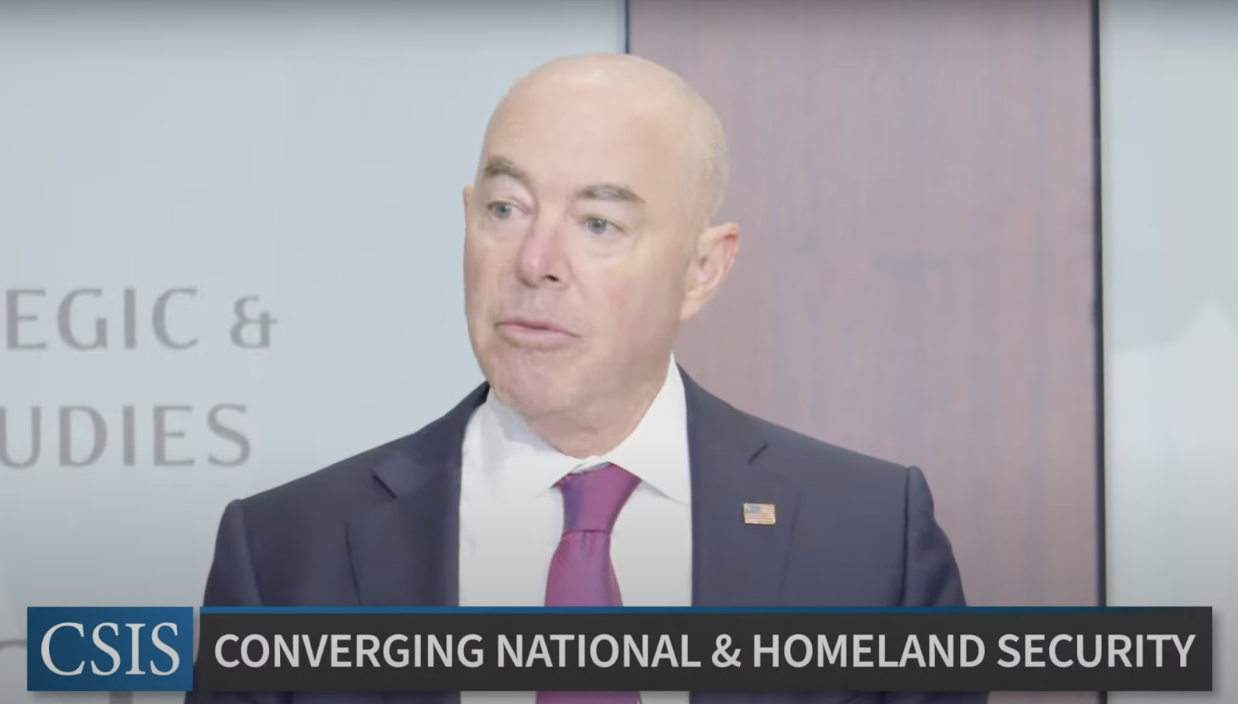The Convergence of National Security and Homeland Security: A Conversation with DHS Secretary Alejandro N. Mayorkas
On December 5, 2022 at 2:30pm, the Center for Strategic and International Studies (CSIS) hosted Department of Homeland Security (DHS) Secretary Alejandro Mayorkas for a talk on the intersection between homeland security and broader national security. Addressing the emergence of cybersecurity issues and growing nation-state adversaries, Mayorkas explained the role of the DHS in the protection against national security threats.
To begin the talk, Mayorkas listed recent instances of cyber attacks that have had major implications on the global scale, specifically the 2017 Russian cyberattacks on Ukraine with Petya software and the 2022 Russian attack on the satellite company Viasat. Mayorkas indicated that currently, “we face a new kind of warfare, no longer constrained by borders or military maneuvers.” The world today, according to him, exhibits more advanced technology, economic and political instability, and interdependence than ever before. It has introduced more threats into domestic infrastructure, including our schools, healthcare system, businesses, and local and state governments.
Mayorkas then explained the capabilities that foreign adversaries possess to target vulnerabilities in the US, singling out Russia and China as the main perpetrators. These nations have enacted cyber attacks aimed to hurt the US economy, damage infrastructure, spread misinformation, or undermine public trust in governmental institutions and elections. As threats have grown, homeland security and national security have thus become increasingly connected.
Mayorkas outlined the measures DHS is taking to protect the US homeland from foreign threats, starting with counterterrorism. On the topic of known terrorist groups like ISIS and Al Qaeda, Mayorka stated that DHS reviews and improves technology through screening and vetting capabilities of DHS agencies such as TSA and shares information with partner nations abroad. He also made note of the domestic terrorism threat, for which DHS is working to counteract by supporting local law enforcement. He continued by saying DHS continues to expand this work by partnering with civil society, local communities, and academia to protect against “all forms of violent extremism.”
Next, Mayorkas discussed the evolving cybersecurity threat. According to him, the proliferation of interconnected services across all sectors and levels of government give adversaries increasingly sophisticated methods to attack. This link between cyber attacks and the US’ responsibility in the international system is the purpose for the Joint Cyber Defense Collaborative (JCDC), which Mayorkas explained brings together the federal government and the private sector to inform the cybercommunity before damaging impacts take place. When damaging incidents do occur, DHS reevaluates its protections through the Cyber Safety Review Board (CSRB) which conducts research and makes recommendations to the public in the face of serious cybersecurity incidents.
Mayorkas noted one such effort by the DHS in the lead up to the Russia-Ukraine War. To protect against potential Russian retaliatory attacks, the DHS enacted a public awareness campaign called Shields Up, which aimed to mobilize the private sector and preemptively increase domestic business’ cyber defenses. Besides cybersecurity, Mayorkas also touched on the DHS’ handling of other transnational threats, such as climate change impact by the Coast Guard and environmental disasters by FEMA.
Next, Mayorkas discussed the DHS’ efforts to maintain economic security. He began by critiquing China for continually exploiting the US global supply chain interdependencies by employing forced labor and profiting off abuses of human rights, claiming it undermines American values. To combat these problems, DHS partners with a number of private and public sector entities to prevent the import of violative goods through a number of policies such as the Uyghur Forced Labor Prevention Act. Mayorkas also listed several other ways DHS agencies ensure products entering the US are ethically produced, such as the inspection of goods entering the US, monitoring of global intellectual property theft, and enforcement of trade laws.
Mayorkas then explained the issue of foreign adversaries that attempt to use targeted investments in US firms to undermine critical infrastructure or to gain access to technology and sensitive information. He gave an overview on President Joe Biden’s September 15 executive order by the Committee on Foreign Investment which involves a collaborative effort between the DHS, Treasury, and the White House to improve protections on the economy and enhance focus on investments that enhance supply chain resilience, technological leadership, cyber security, and defense on sensitive personal data.
To conclude the talk, Mayorkas highlighted the DHS’ strong value for international alliances and multilateral forms in order to carry out national security objectives, such as the G7 and Five Eyes partnership, calling it essential for the DHS’ program. He stated it was an important practice to share information and key strategies to help address transnational threats and counter belligerent nation-states, reiterating the dangerous threats we face today. As these issues continue to evolve, Mayorkas asserted that securing the nation will be even more essential and that DHS will continue to evolve its strategies.

